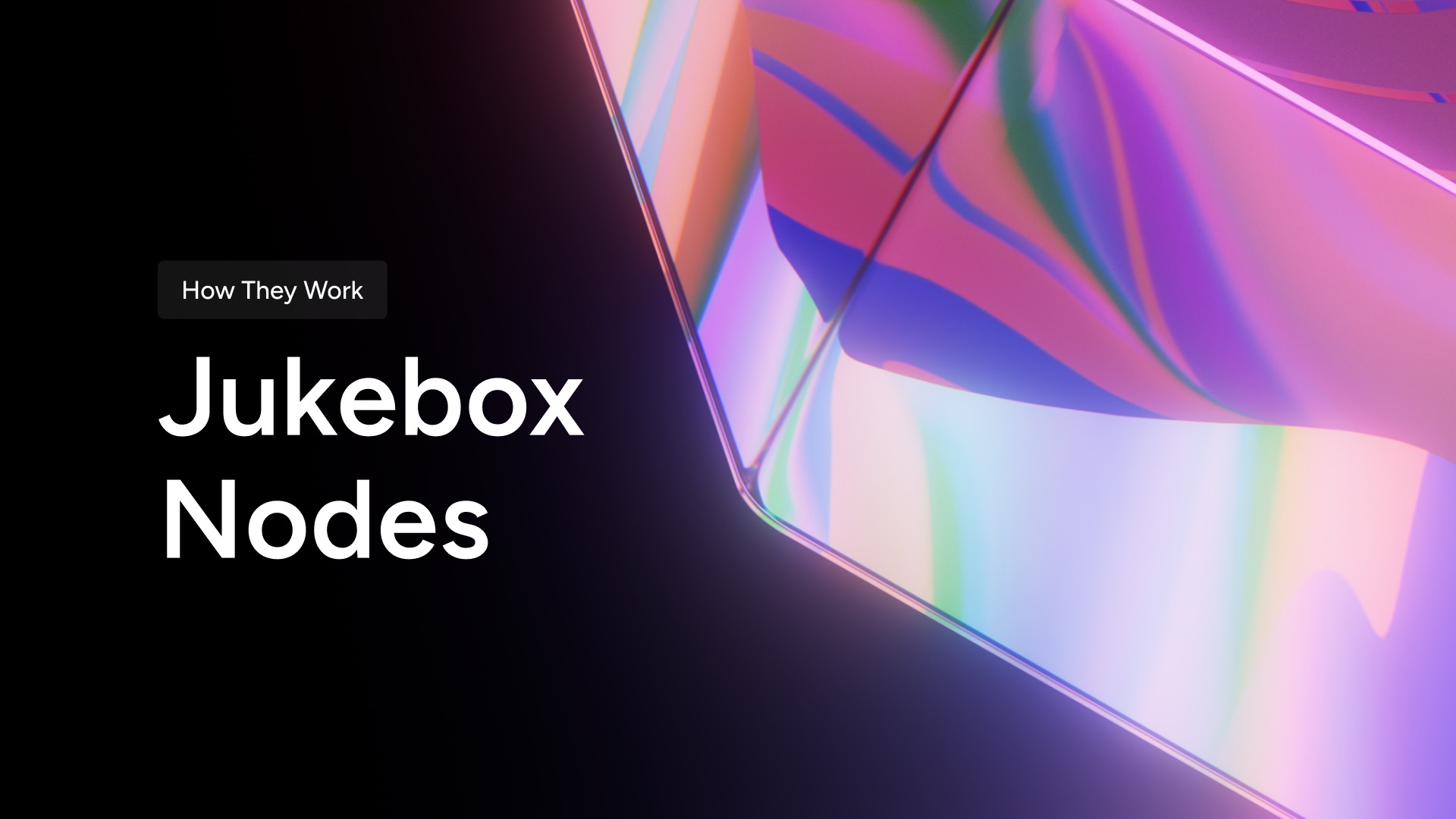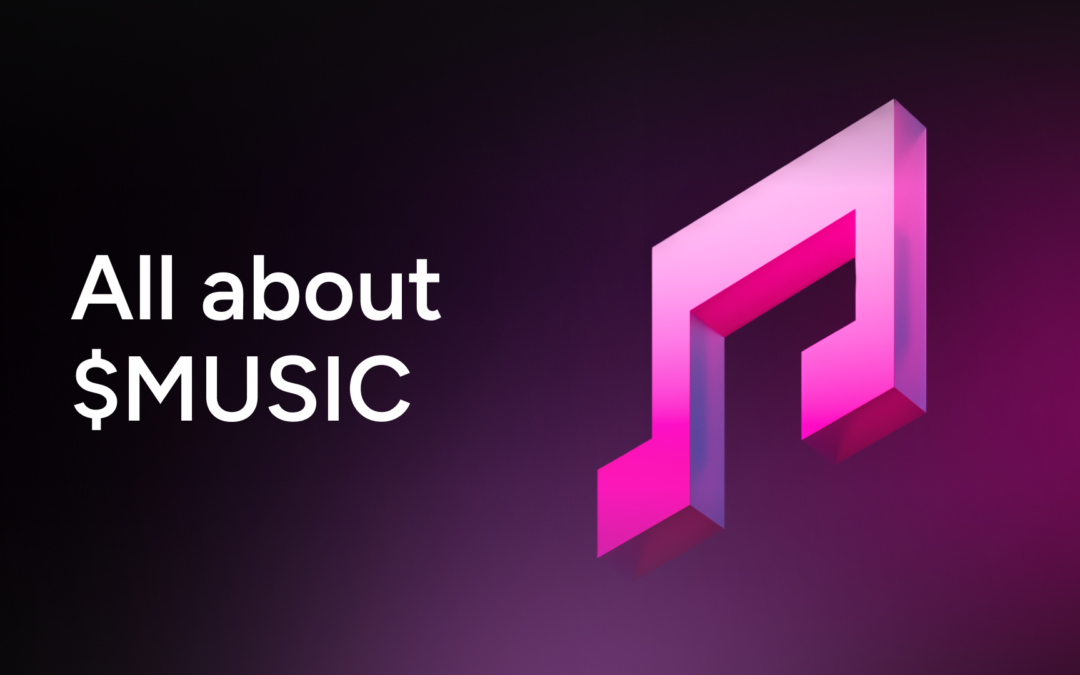Check out the new Dogg Pound exclusives!
Check out the latest All Access Experiences
Calling Musicians: Artist Upload is ready to empower your career
Introduction to Jukebox Nodes
To power our network of decentralized music, Gala Music has introduced a groundbreaking concept known as Jukebox Nodes. Part of a larger framework called DePIN (Decentralized Physical Infrastructure Network), these nodes empower individuals to participate directly in hosting and distributing music on the platform.
By becoming a Jukebox Node operator, users can contribute to a global network that supports the Gala Music ecosystem, enhancing music accessibility and unlocking some serious potential $MUSIC rewards.
Hosting Tracks on a Jukebox Node
In order to generate $MUSIC rewards based on their platform plays, NFT tracks must be paired with an active Jukebox Node. Pairing is always initiated by the track owner, and the track owner has the option to pair to a specific Jukebox Node if they wish. This pairing action is essentially hosting the track on the decentralized Gala Music servers, making it accessible to listeners and eligible for reward distribution based on plays.
Each Jukebox Node has a limited number of slots where track NFTs can be placed. While a standard Jukebox Node starts with 10 available slots, Jukebox Node operators have the option to purchase upgrades, adding more slots and thereby increasing the potential $MUSIC rewards generated for hosting tracks on that node.
Understanding DePIN
A DePIN, or Decentralized Physical Infrastructure Network, is a network where the infrastructure is distributed among numerous independent operators rather than centralized in a single location or controlled by a single entity. For example, Spotify relies on its centralized data centers in multiple global locations. In contrast, Gala Music streaming is hosted entirely on its distributed network of Jukebox Nodes, operated by community members who are licensed to run them in exchange for rewards.
This approach not only enhances the resilience and scalability of the network but also democratizes the economic benefits, allowing individuals to contribute to and benefit from the system.
The Role of Jukebox Nodes
Jukebox Nodes are the backbone of the Gala Music platform. They host and serve music tracks to listeners, ensuring that music is always available and accessible. Any licensed user with the necessary hardware and internet connection can set up a Jukebox Node and start hosting music. This decentralization helps prevent the system from having single points of failure, which are common in traditional centralized servers.
As the platform’s streaming demands increase, more JukeBox Node licenses are sold to accommodate the hosting needs.
JukeBox Node licenses are currently available for purchase here.
Workloads on the Blockchain
In blockchain terminology, a ‘workload’ refers to the tasks that nodes perform to maintain the network. For Jukebox Nodes, the primary workload involves hosting and streaming music tracks. These tasks are crucial because they ensure that music is always available to users whenever they want to listen. By fulfilling these workloads, Jukebox Nodes support the entire ecosystem, ensuring its operability and reliability.
Rewards for Node Operators
Operating a Jukebox Node is not only about supporting the network but also about gathering rewards. Node operators are basically allowing their computers to act as GalaChain employees, receiving $MUSIC tokens as compensation for their contributions.
$MUSIC rewards are generated based on several factors, including the number of tracks hosted, the uptime of the node (a minimum of 20 hours daily is required), and the popularity of the music streamed from their node. This incentivizes operators to maintain their nodes actively and ensures that popular tracks are readily available, enhancing listener satisfaction.
You’ll find more information about JukeBox Nodes in the Gala Music Whitepaper.
Node Slots
Each Gala Music Jukebox Node has a limited number of slots where hosted tracks will live as long as they are paired with that node.
Every new Jukebox Node comes with 10 slots, but all Jukebox Nodes can be upgraded to contain additional slots. By adding slots to a Jukebox Node, an operator can increase their potential $MUSIC rewards by hosting more music.
Each new slot may be purchased with $MUSIC alone. For a more detailed guide on how to purchase additional slots for your Jukebox Node, check out THIS SUPPORT ARTICLE.
How Node Operators Benefit the Ecosystem
Node operators play a critical role in the Gala Music ecosystem by:
- Ensuring Availability: By hosting music tracks, operators ensure that there is no downtime, which can be a significant issue with centralized servers.
- Enhancing Performance: Distributed hosting reduces latency since music is streamed from a node geographically closer to the listener.
- Growing the Platform: As more nodes join the network, the platform’s capacity to host and stream music increases, which can accommodate more users and tracks without the need for significant infrastructure investment from Gala Music itself.
Setting Up and Running a Jukebox Node
If you are newly licensed to operate a Gala Music Jukebox Node, follow these instructions to begin operating your node and hosting tracks.
- Download the Gala Node Software
Login with your Gala account credentials at https://node.gala.com/ and navigate to the “Download” menu. Download the software for your operating system (Windows, macOS or Linux).
- Install the Gala Node Software on Your Computer
Follow the instructions on the page to install the software on your computer. For more in-depth instructions on installing the Gala Node software, please consult the following guides, which will walk you through the installation on each operating system.
- Activate Your Jukebox Node
Once the Gala Node Software is properly configured and your Node license appears in your dashboard, you must activate your node on Gala Music to begin running its workload and hosting tracks. This can be done through the “Nodes” page when logged into your account on Gala Music. For detailed instructions, please read THIS SUPPORT ARTICLE.
Powering the Revolution
Gala Music Jukebox Nodes represent a unique opportunity for individuals to engage with web3 technology in a meaningful way. By operating a node, you not only gain rewards through $MUSIC tokens but also contribute to a decentralized music streaming network that empowers artists and fans alike.
This system challenges traditional music distribution models while paving the way for a more inclusive, efficient and user-driven future in digital entertainment. Whether you’re a tech enthusiast, a music lover or someone curious about the potential of blockchain, setting up a Jukebox Node offers a front-row seat to the future of music.





